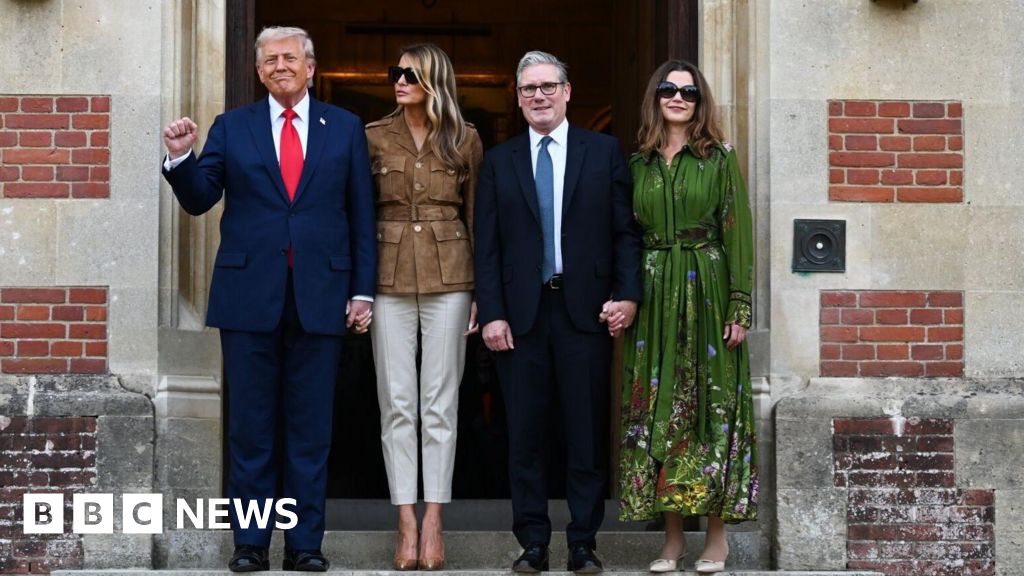
Trump suggests Starmer could use military to control UK borders

Trump Suggests Military Action to Address UK Border Control
In a recent news conference following his second state visit to the United Kingdom, former U.S. President Donald Trump made a provocative suggestion regarding the management of illegal migration in the UK. He proposed that Prime Minister Sir Keir Starmer could consider deploying military forces to control the nation’s borders, particularly in response to the rising number of migrants crossing the English Channel in small boats.
Discussion on Migration Issues
During a meeting held at Chequers, the Prime Minister’s country residence, Trump and Starmer discussed various migration challenges facing both the United States and the UK. Trump, who has been vocal about his administration’s aggressive policies to secure U.S. borders, emphasized that the UK is encountering a similar crisis. He stated, “You have people coming in, and I told the Prime Minister I would stop it, and it doesn’t matter if you call out the military, it doesn’t matter what means you use.” His remarks underline a growing concern over illegal immigration, which he argues can “destroy countries from within.”
Since returning to the White House in January, Trump has intensified deportations of undocumented immigrants and has implemented stricter measures to curb unlawful border crossings. His comments reflect a broader discussion on immigration policy, which has become a contentious topic in both American and British political landscapes.
The Context of the Visit
Trump’s visit to the UK was marked by a series of ceremonial events, including a state banquet hosted by King Charles and the Royal Family. The President and First Lady Melania Trump departed from Stansted Airport shortly after the news conference, concluding their two-day visit filled with diplomatic engagements.
During the press conference, Trump and Starmer also addressed a range of issues, including Palestinian statehood, free speech, the ongoing war in Ukraine, and energy policy. Both leaders highlighted the enduring “special relationship” between the UK and the US, announcing a new technology deal aimed at enhancing cooperation in artificial intelligence (AI) and other emerging technologies. This tech prosperity deal is expected to encourage U.S. investment in the UK, further solidifying the economic ties between the two nations.
Controversial Topics and Shared Views
While the leaders expressed mutual respect and camaraderie, they also navigated several contentious subjects. For instance, when asked about the recent dismissal of Lord Peter Mandelson as the UK’s ambassador to the US, Trump deflected the question by stating, “I don’t know him actually,” before passing the question to Starmer. Mandelson’s firing was linked to his connections with the late convicted sex offender Jeffrey Epstein, a sensitive topic that could have led to an awkward exchange.
One of the more significant disagreements between Trump and Starmer emerged regarding Palestinian statehood. Starmer expressed intentions to recognize Palestine ahead of the upcoming United Nations General Assembly, a move that Trump opposed. He criticized the Palestinian armed group Hamas for using hostages as “bait” in the ongoing Gaza conflict. Currently, Palestine enjoys recognition from 147 of the 193 UN member states, but it lacks defined borders, a capital, and a formal military.
Views on the War in Ukraine
The war in Ukraine also featured prominently in their discussions. Trump expressed disappointment in Russian President Vladimir Putin for not engaging more actively in peace negotiations. He urged Western allies to cease purchasing Russian oil as a strategy to compel Putin to the negotiating table, although he refrained from committing to specific sanctions against Moscow.
Despite their differing views on certain international matters, there was a notable consensus between Trump and Starmer regarding the need to address illegal migration. Starmer stated that his government is taking the issue “incredibly seriously,” highlighting the actions taken to combat people-smuggling networks and the recent implementation of a “one-in, one-out” scheme with France. This initiative includes the first migrant return under the new agreement, which Starmer described as “an important step forward,” while acknowledging that there is “no silver bullet” to resolve the issue.
The rise in illegal crossings has become a pressing concern in British politics, with over 30,000 individuals having crossed the Channel in small boats this year alone—the highest number recorded at this point in the year since data collection began in 2018. This surge in migration has placed significant pressure on the Prime Minister to devise effective solutions.
Conclusion
As the UK grapples with the complexities of immigration policy, Trump’s comments serve as a reminder of the ongoing debates surrounding border security and the various approaches that leaders may consider to address these challenges. The discussions between Trump and Starmer reflect a blend of shared concerns and differing perspectives on how best to navigate the intricate landscape of international migration and geopolitical relations.
Key Facts
– Trump suggested that PM Sir Keir Starmer could use military forces to manage illegal migration in the UK.
– The discussion occurred during Trump’s state visit, which included ceremonial events with the Royal Family.
– Trump emphasized the need for strong border security, sharing his own policies from his presidency.
– The leaders also discussed Palestinian statehood and the war in Ukraine, showcasing both agreement and disagreement on various issues.
– Over 30,000 migrants have crossed the English Channel this year, marking a record high for this time of year since 2018.
Source: www.bbc.com
